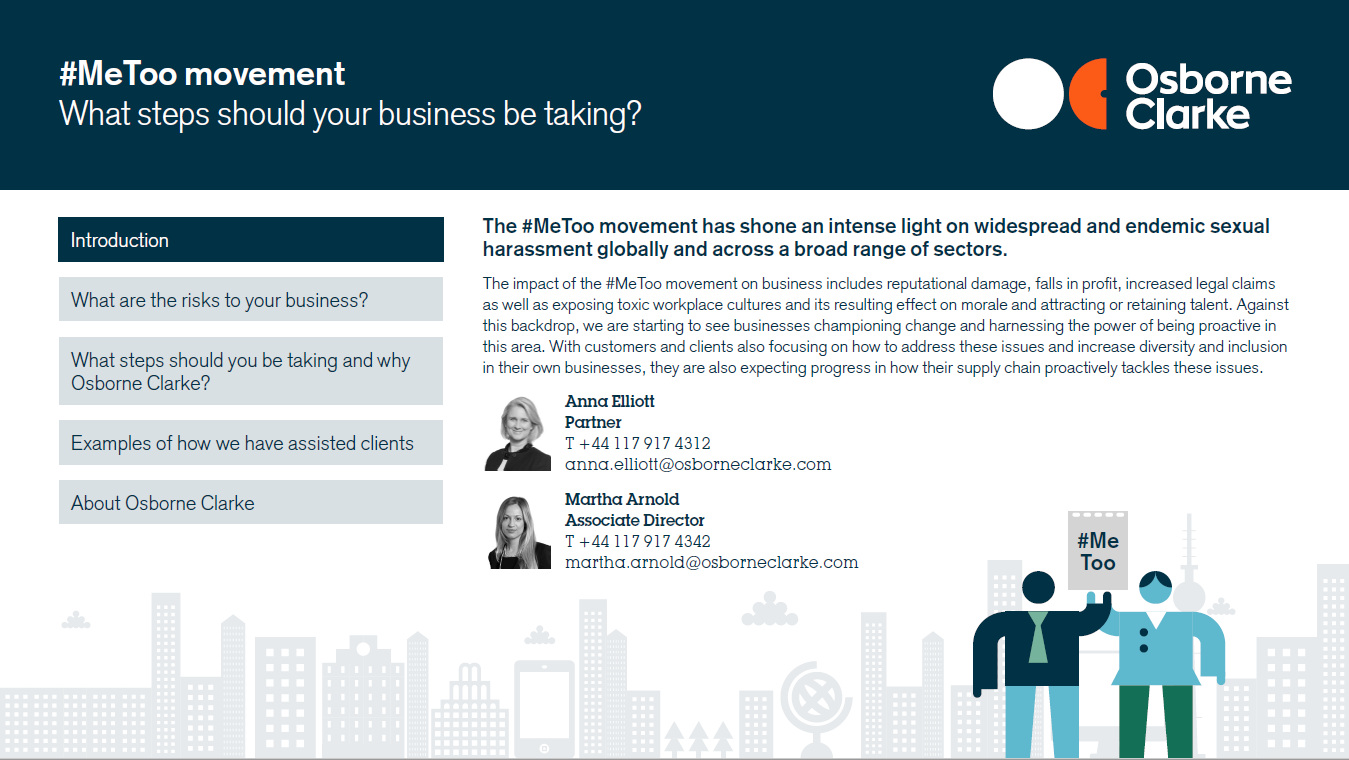The impact of the #MeToo movement from an HR and employment perspective
Published on 5th March 2020
The #MeToo movement has shone an intense light on widespread and endemic sexual harassment globally and across a broad range of sectors. In our latest video employment lawyers Anna Elliott and Martha Arnold discuss the impact of the #MeToo movement from an HR and employment perspective.
Read the transcript.
If you're interested in finding out more, take a look at our interactive PDF below where we explain what steps your business should be taking.
Transcript
AE: Hello and thanks for your interest in this topic. Martha and I are employment lawyers we've spent many years advising clients on issues relating to sexual harassment, discrimination and bullying and we thought we'd just get together to discuss how the impact of the MeToo movement has really been felt in this area from an employment law and HR perspective. So it has been two years since women started publicly accusing Harvey Weinstein of sexual misconduct and we've seen a raft of media reports since then and obviously most recently with his criminal trial now taking place and I think in terms of the cultural shift that has arisen as a result of that movement there has been you know such a significant change. So with that context in mind and the way it has impacted women globally in all sorts of different industries and businesses, some to more degrees than others, I thought it would be good to just chat through what we've seen as the impact and from an employment law and HR perspective of that movement.
MA: Absolutely and I think there's a number of stages of the impact. So at a legal level what we've seen is a dramatic increase in the number of sexual harassment claims being brought in the tribunal and of course that places those employers under a particular pressure to either defend those claims in the tribunal risking not only the potential awards of compensation that could follow, but also the reputational impact or to settle those claims. But if you look at the settlement route, that itself has actually been impacted because now the different ways that you can place confidentiality provisions within those settlement agreements has been significantly curtailed and that's of course a real reason why businesses might want to settle a claim like that in the first instance. So I think that's a relevant development and I think at a wider level what we're seeing is that employees, the workforce in general are actually are so much more aware of their rights in this area and they're expecting their employers to actually step up, talk to them about it and have a particular and practice and policy about it and to actually enforce that in practice as well.
AE: Yeah absolutely and I think we've certainly seen a rise in terms of potential claims and issues occurring that are now probably not tolerated as much as they may have been many years ago, which is a good thing. But people are definitely feeling more empowered I think to come forward and are also demanding a bit more in terms of what's being done about it. So given that background and all the potential impacts, what are the risks to the business of these issues occurring in the workplace?
MA: So we touched on claims and I think we look at that in a little bit more detail. Employers will be, as we know, vicariously liable for the actions of their employees where they're found to be undertaking in the course of employment, unless they can show that they've engaged in reasonable steps and have a defence on that basis. So what we're seeing is employers rightly looking at what those reasonable steps should be but actually that's still a risk area if they don't do that effectively is having a compensation award made against them. I think at a kind of slightly different level is the reputation impact. So if these sort of allegations are made there's always going to be some reputation impact but the way that they are handled and managed can dramatically impact on how you know what the negative impacts actually is on the business and on the brand. And I think that's a significant factor where there isn't proactive steps taken and a matter kind of spirals out of its own control. I think looking wider there are other impacts in terms of the way the employees feel about the matter, so we're seeing impacts on employee turnover. So you might lose key talent, you might have more cost in terms of recruiting and more of your workforce but also in terms of productivity so if you've got an unhappy workforce that will have those base wider impacts as well.
AE: Absolutely I think also diversity and inclusion issues generally are also part of this in terms of what businesses are doing to attract talent and if you're known as having a toxic workplace culture where these issues are not being addressed properly then again that can also have a knock-on effect. So there are some real risks to business in terms of these issues occurring in the workplace. You touched on reasonable steps and obviously that being part of a defence to vicarious liability claim that the employer is responsible for the acts of its employees, should this misconduct occur. So in that regard what kind of steps should employers be taking to deal with these types of issues and why?
MA: I think from our perspective what we like to see is an employer taking a particular stance on it communicating with their workforce clearly and then standing behind that. So in practical terms we think it's most effective for there to be comprehensive training sessions so we're not necessarily talking about those sort of training sessions that employees do in isolation at their desk but one where actually you can engage with your workforce and make sure that they really understand what you expect of them and what you expect them not to do. I think it's also about making sure that you've got really clear channels for employees to report matters and that you make sure that you publicise and communicate that thoroughly so that there's no inference that actually you don't want to know about the problems. So it's part of that and it's also looking at the culture generally isn't it and actually making sure that yes, you have these policies you have the training in place but you actually adhere to them in practice and making sure that any decisions taken are consistent with that because that ultimately what's going to really drive the message home to your workforce that it is an issue you take seriously.
AE: That's a really good point because if you merely pay lip service and have a policy in place but you don't actually implement it in practice, say for example you have a zero tolerance policy and then there is no zero tolerance and things are tolerated then it's not going to stand up in terms of a vicarious liability defence. So yeah some really good points there in terms of and some of the initiatives that businesses are taking. I think we're certainly helping a lot of our clients with training and things like that around that. So hopefully that's given you a few things to think about in this area and if you'd like to know more then please contact us. Thanks.





